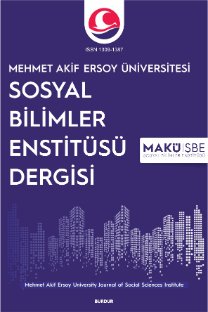KONGRE/TOPLANTI TURİZMİNDE HİZMET KALİTESİNİN DEĞERLENDİRİLMESİNE YÖNELİK BELEK/ANTALYA BÖLGESİNDE BİR NİTEL ARAŞTIRMA
Kongre Turizmi, Toplantı Turizmi, Hizmet Kalitesi, Otel İşletmeleri., Congress Tourism, Meeting Tourism, Service Quality, Hotel Businesses.
A QUALITATIVE RESEARCH ON THE EVALUATION OF SERVICE QUALITY IN CONGRESS/MEETING TOURISM IN BELEK/ANTALYA REGION
Congress Tourism, Meeting Tourism, Service Quality, Hotel Businesses.,
___
- Akova, O. ve Baynazoğlu, M. E. (11-13 Ekim 2012). Congress tourism in Turkey: Swot analysis and related strategies [Bildiri Metni]. International Conference on Eurasian Economies, Almaty-Kazakhstan. https://avekon.org/papers/513.pdf
- Aksu, A., Erdinç Ören, V., Sinan, V. ve Özcan, C. (2004). Evaluation of congress tourism development in the world and in Turkey. Tourism Review, 59(1), 44-46. https://doi.org/10.1108/eb058429
- Albarq, A. N. (2014). Measuring the impacts of online word-of-mouth on tourists' attitude and intentions to visit Jordan: An empirical study. International Business Research, 7(1), 14-22. https://doi.org/10.5539/ibr.v7n1p14
- Artuğer, S. ve Şahin, S. K. (2020). Hizmet ortamı, müşteri memnuniyeti ve tekrar ziyaret etme niyeti ilişkisi: resort otellerde bir araştırma. Türk Turizm Araştırmaları Dergisi, 4(3), 2441-2455.
- Asubonteng, P., McCleary, K. J. ve Swan, J. E. (1996). SERVQUAL revisited: A critical review of service quality. Journal of Services Marketing, 10(6), 62-81. https://doi.org/10.1108/08876049610148602
- Aşık, N. A. (2014). Termal otel müşterilerinin memnuniyet düzeylerini belirlemeye yönelik bir araştırma. Uluslararası Hakemli Pazarlama ve Pazar Araştırmaları Dergisi, 2(1), 109-123.
- Atılgan, E., Akıncı, S. ve Aksoy, S. (2003). Mapping service quality in the tourism industry. Managing Service Quality: An International Journal, 13(5), 412-422. https://doi.org/10.1108/09604520310495877
- Balasingh, J. R., Sudhahar, J. C., Japhynth, J. ve Israel, D. (2006). Evolution of service quality measurement instrument–A Retro Analysis. Smart Journal of Business Management Studies, 2(2), 36-45.
- Bhat, M. A. (2012). Tourism service quality: A dimension-specific assessment of SERVQUAL. Global Business Review, 13(2), 327-337. https://doi.org/10.1177/097215091201300210
- Cronin Jr, J. J. ve Taylor, S. A. (1992). Measuring service quality: A reexamination and extension. The Journal of Marketing, 56(3), 55-68. https://doi.org/10.2307/1252296
- Çetinsöz, B. ve Artuğer, S. (2013). Antalya ili’nin marka değerinin ölçülmesine yönelik bir araştırma. Anatolia: Turizm Araştırmaları Dergisi, 24(2), 200-210.
- Çizel B. (1999). Kongre turizmi, kongre organizasyonu ve Antalya bölgesinin kongre turizmi potansiyeli, sorunları ve gelecekteki beklentilerine yönelik bir araştırma [Yayımlanmamış Yüksek Lisans Tezi]. Akdeniz Üniversitesi.
- Dabholkar, P. A., Thorpe, D. I. ve Rentz, J. O. (1996). A measure of service quality for retail stores: scale development and validation. Journal of the Academy of Marketing Science, 24(1), 3-16.
- Fick, G. R. ve Brent Ritchie, J. R. (1991). Measuring service quality in the travel and tourism industry. Journal of Travel Research, 30(2), 2-9.
- Ghylin, K. M., Green, B. D., Drury, C. G., Chen, J., Schultz, J. L., Uggirala, A., Abraham, J. K. ve Lawson, T. A. (2008). Clarifying the dimensions of four concepts of quality. Theoretical Issues in Ergonomics Science, 9(1), 73-94. https://doi.org/10.1080/14639220600857639.
- Gregorić, M., Naš ve Gregorić, M. (2016). Potential of congress tourism in the Republic of Croatia in comparison to neighboring destinations. Acta Economica Et Turistica, 2(2), 195-209. https://doi.org/10.1515/aet-2016-0017
- Timor, A. N. (2011). International congress tourism: overview in the world and Turkey. Nature Sciences, 6(3), 124-144.
- Yıldız, U. (2019). Effectiveness of tourism potential of alternative tourism diversity, Int.J. Hum. Soc. Dev. Res., 3(1), 66-85. https://doi.org/10.30546/2523-4331.2019.3.1.66
- Yozcu, Ö. K. ve İçöz, O. (2010). A model proposal on the use of creative tourism experiences in congress tourism and the congress marketing mix. Pasos Revista de Turismo y Patrimonio Cultural, 8(3), 105- https://doi.org/113. 10.25145/J.PASOS.2010.08.038
- Zeithaml, V. A. (1988). Consumer perceptions of price, quality, and value:A means-end model and synthesis of evidence. The Journal of marketing, 52(3), 2-22. https://doi.org/10.2307/1251446
- Zhao, Y. L. ve Di Benedetto, C. A. (2013). Designing service quality to survive: Empirical evidence from Chinese new ventures. Journal of Business Research, 66(8), 1098-1107. https://doi.org/10.1016/j.jbusres.2012.03.006
- Yayın Aralığı: 4
- Başlangıç: 2009
- Yayıncı: Burdur Mehmet Akif Ersoy Üniversitesi Sosyal Bilimler Enstitüsü
MODERN TERÖR ÖRGÜTLERİNİN ŞİDDET KULLANIMINA YÖNELİK DEĞİŞEN STRATEJİSİ: FETÖ/PDY ÖRNEĞİ
ANTİK ÇAĞIN TEHLİKELİ YÖNETİMİNDEN GÜNÜMÜZÜN VAZGEÇİLMEZ REJİMİNE: DEMOKRASİ
Abdulvahap AKINCI, Emrullah Mert KOYUNCU
TEDARİKÇİ SEÇİMİ PROBLEMİNİN AHP TEMELLİ MAIRCA YÖNTEMİ İLE ÇÖZÜMÜ
DENİM KUMAŞIN SANAT MALZEMESİ OLARAK KULLANIMINA YÖNELİK DENEYSEL YAKLAŞIMLAR
BAHTİYAR VAHABZADE: GEÇİP GİDEN ZAMANA NOTLAR
UNICEF ÇOCUK REFAHI SAĞLIK GÖSTERGELERİNE GÖRE OECD ÜLKELERİNİN KARŞILAŞTIRILMASI
ÜSTÜN EVRENSEL DEĞER KAVRAMININ UYGULANABİLİRLİĞİNE YÖNELİK ÇABALAR
